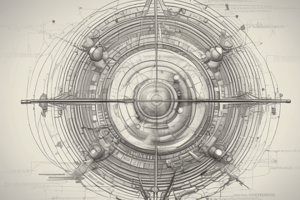Podcast
Questions and Answers
What is the first step of the scientific method?
What is the first step of the scientific method?
Identifying the Problem
Which of the following is NOT part of the scientific method?
Which of the following is NOT part of the scientific method?
- Creating a Theory (correct)
- Conducting an Experiment
- Identifying the Problem
- Sharing Results
Scientific observations must be subjective.
Scientific observations must be subjective.
False (B)
What is conducted after creating a hypothesis?
What is conducted after creating a hypothesis?
What must be reviewed and analyzed to determine if the hypothesis is supported?
What must be reviewed and analyzed to determine if the hypothesis is supported?
The last implicit step of the scientific method is __________.
The last implicit step of the scientific method is __________.
What is the role of statistical analyses in scientific inquiry?
What is the role of statistical analyses in scientific inquiry?
Study Notes
The Scientific Method
- A structured process for answering questions through observations, experiments, and deductive reasoning.
- Begins with identifying a problem or question stemming from observations.
Steps of the Scientific Method
- Comprises five basic steps aimed at organizing experiments and interpreting results.
- Reflection and sharing findings with others are essential implicit steps.
Identifying the Problem
- Requires objective observations that can be replicated by others.
- Initial observations often build upon previous experiments conducted by others.
- Scientific knowledge is cumulative, where past research informs future inquiries.
Asking a Question
- Formulating a question based on observations is crucial for further investigation.
Researching the Question
- Involves gathering background information to refine and improve experimental designs.
- Assessing available resources is important; questions may need to be adjusted accordingly.
Creating a Hypothesis
- Hypotheses are formed through deductive reasoning to predict potential outcomes of experiments.
Conducting Experiments
- Involves systematic data collection which must be thoroughly analyzed to determine support for the hypothesis.
Collecting and Analyzing Data
- Data analysis may include statistical methods to establish significance and differentiate results from random chance.
Drawing Conclusions
- Conclusions should assess experimental methods that may influence results and should resolve the initial research question.
- Experiments often lead to new questions, refining the inquiry cycle.
Sharing Results
- Dissemination of research findings through journal articles and conferences is vital for scientific progression.
- Sharing facilitates verification by other scientists and contributes to the formulation of new hypotheses and inquiries.
Studying That Suits You
Use AI to generate personalized quizzes and flashcards to suit your learning preferences.
Related Documents
Description
Explore the foundational steps of the scientific method in this quiz. Understand how to formulate a question, design experiments, and analyze results. Test your knowledge on the essential elements that drive scientific inquiry and experimentation.



